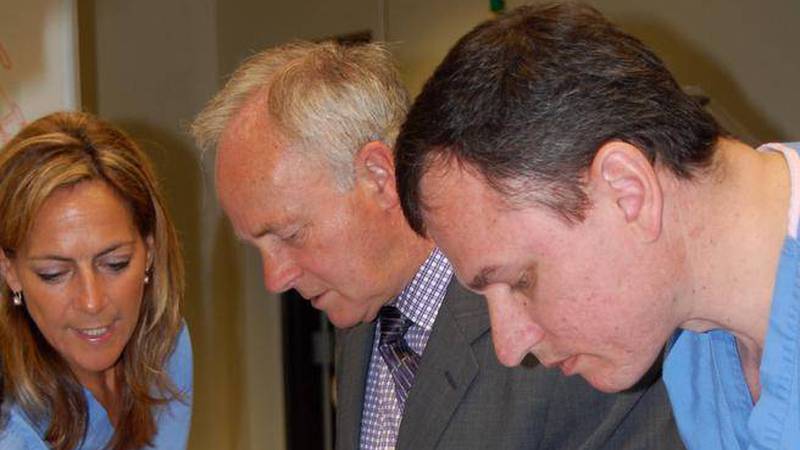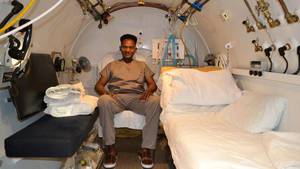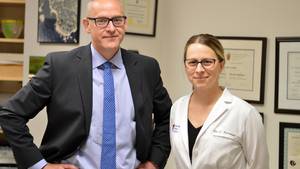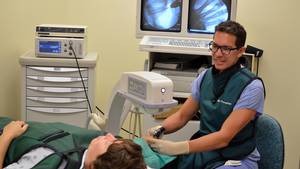|
|
| Michelle Murray, coordinator at the Skills Centre for Health Sciences at the QEII, works with Health Minister Leo Glavine on surgical skills. (Contributed) |
A former educator and high school administrator, Minister Glavine is now trying to make a difference for the health of all Nova Scotians. As the province begins its transition to a new structure of health authorities, the common goal is to build healthy communities. The Minister shares his thoughts about the transition, the role of the QEII and improving health care for the province.
What do you enjoy most about being Minister of Health and Wellness?
Being a lifelong learner; what a fabulous opportunity to learn. I’ve enjoyed the learning and seeing the face of health care across the province.
There is literally a goldmine of expertise and commitment [across Nova Scotia] to improving the healthcare system in the province.
What are some of Nova Scotia's greatest health challenges?
A thousand Nova Scotians every month are turning 65 years old. In 10 years time, close to one third of our population will be 65 plus. They will want the best health care.
Providing the best elder care and meeting our seniors at every entry point in the health care system [is one of our biggest challenges].
You recently toured all of the health districts across the province. What did you learn from this tour?
I met everyone from CEOs to maintenance staff in hospitals. It gave me an opportunity to see what takes place in the healthcare system on a daily basis. It was a wonderful education.
In all corners of the province I saw the level of confidence, capability and dedication of healthcare providers. It really is the hallmark.
The government is working to amalgamate the current health districts from ten to two. How will patient care be improved with this upcoming amalgamation?
I heard from people that we need a standard of care right across the province that is measurable and accountable.
We do have a fragmented system in some of our areas. We want one provincial system that puts emphasis on strong patient outcomes. Instead of having different variations across the province, we want to see best practises. [For example] we need to put in place a provincial surgical program. It’s a very connected approach.
The QEII Health Sciences Centre serves as the specialized care centre for Atlantic Canada in areas such as heart health, cancer care, neurosurgery and organ transplantation. How important is the QEII to delivering health care in this province?
As we restructure [the province’s healthcare system] we have an opportunity to give prominence to the role of the QEII. When travelling the province, I talked about the QEII as our provincial hospital. This is where the highest level of care is being provided each and every day to Nova Scotians.
I constantly applaud the approach where research, academia and clinical all come together like they do at the QEII Health Sciences Centre in conjunction with the Dalhousie Medical School. We need to make sure that it remains strong for the future. It has allowed us to land some of the top people who work in health care.
Healthcare foundations fund 25 per cent of all capital expenses. How do you partner and work with these foundations?
When I look at that 25 per cent, at what foundations represent, it is absolutely critical. We need to celebrate and treasure the work of foundations. I see a real partnership with the Department of Health and Wellness. I will only work towards having the strongest partnership.
Health care accounts for almost half of the provincial budget. How can citizens help contribute to improving the system?
Getting healthy and staying healthy for as long as they can. I think that can be the greatest contribution.
We need a culture of wellness. We have some of the highest levels of chronic diseases. We have to have a huge shift. All of us right now, no matter the age, workplace or organization. We have to start to do a little bit toward wellness every day. That will be our greatest step toward a sustainable healthcare system.
We have to work toward a disease prevention model.
If there are small little initiatives [around increasing exercise, healthy eating, reducing smoking, alcohol intake and stress] they end up with huge results.
You appear as a very accessible, caring Minister who wants to make a real difference. What are your top three goals in improving health care?
My first goal is to restructure the healthcare system. It won’t be about centralizing. It’s about developing a highly integrated system. We have an opportunity to become a leading healthcare system in the country.
My second goal is for all of us to take the highest regard and respect for our own health. I equate health with a high quality of life.
We have to remember that just because we can perform complex life saving procedures; these should never replace the need to take care of our own health. Health care is not free. We all need to invest in our personal health.
My third goal is to look at best practises in primary health care. Primary health care is one of the goals I want to see improved.
We need to look at the collaborative healthcare teams that are emerging across the province.








